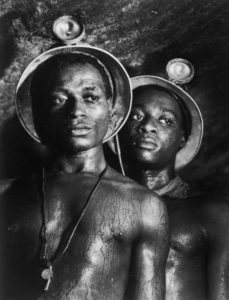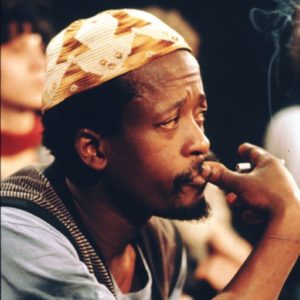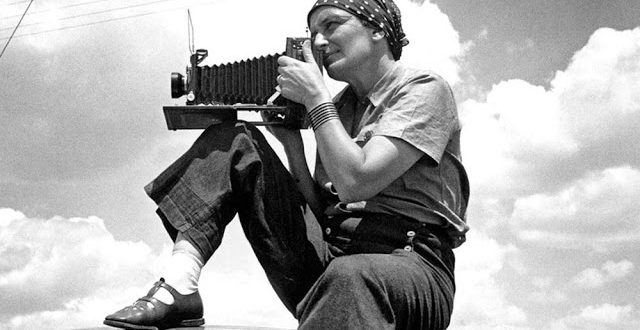Podcast: Play in new window | Download (Duration: 59:00 — 81.0MB)

Today’s show offers a remix of a July 2016 interview with Alex Lichtenstein on the documentary photographs of Margaret Bourke-White, “Focus on Apartheid.” The conversation was recorded live in our WFHB studios.
All of our music for this remix comes from five albums by Johnny Dyani, South African double bassist and pianist. In the early 1960s, Dyani was a member of South Africa’s first integrated jazz band, The Blue Notes. In 1964, the band fled South Africa to seek musical and political freedom. We’ll open with “Needle Children,” off of the 1984 release, Afrika.
As a photographer for Life and Fortune magazines, Margaret Bourke-White traveled to Russia in the 1930s, photographed the Nazi takeover of Czechoslovakia in 1938, recorded the liberation of Buchenwald a the end of World War II, and documented “Calcutta streets strewn with putrefying corpses decaying in the heat and being consumed by bloated vultures” in the aftermath of the 1946 Muslim-Hindi communal riots. In 1949, Life magazine sent her to South Africa to take photographs in a country that was becoming racially polarized by white minority rule. Life published two photo essays highlighting Bourke-White’s photographs, but much of her South African work remained unpublished…that is, until our guest got his hands on it.

In Margaret Bourke-White and the Dawn of Apartheid, published by Indiana University Press, Alex Lichtenstein and co-author Rick Halpern include two essays that explore Bourke-White’s artistic and political formation and provide background material about the cultural, political, and economic circumstances that produced the rise and triumph of Afrikaner nationalism in South Africa.
And a brief note from 2021 listening back on 2016 – it’s quite something to realize how much doing the work of producing this program has taught me. I say frequently that my ignorance appears to be limitless and so to the topics for Interchange conversations. Every program fills in a bit of what I’ve been missing and I hope you feel the same way.
GUEST
 Alex Lichtenstein is the Editor for the American Historical Review and Professor of History at Indiana University, where he teaches US and South African history. His research focuses on the intersection of labor history and the struggle for racial justice in societies shaped by white supremacy. His first book, Twice the Work of Free Labor, examined the role of convict leasing and chain gangs in the remaking of the American South in the half century after the Civil War. His most recent publication is Marked, Unmarked, Remembered: A Geography of American Memory, with his brother, photographer Andrew Lichtenstein.
Alex Lichtenstein is the Editor for the American Historical Review and Professor of History at Indiana University, where he teaches US and South African history. His research focuses on the intersection of labor history and the struggle for racial justice in societies shaped by white supremacy. His first book, Twice the Work of Free Labor, examined the role of convict leasing and chain gangs in the remaking of the American South in the half century after the Civil War. His most recent publication is Marked, Unmarked, Remembered: A Geography of American Memory, with his brother, photographer Andrew Lichtenstein.
RELATED
Photos in Black and White: Margaret Bourke-White and the Dawn of Apartheid in South Africa
22 Pictures That Helped Define The 20th Century
Interchange – Focus on Apartheid: The Photojournalism of Margaret Bourke-White (July 19, 2016 – live version)
Interchange – Shooting the Gulf: Allan Sekula In the American Grain (documentary and political photography)
 MUSIC by Johnny Dyani
MUSIC by Johnny Dyani
“Needle Children” (Afrika)
“Radebe” (Witchdoctor’s Son)
“Lonely Flower in the Village” (Song for Biko)
“Angolian Cry” (Angolian Cry)
“Song for the Workers” (Born Under the Heat)
ID underbed – “Jo’burg – New York” (Song for Biko)
CREDITS
Producer & Host – Doug Storm
Executive Producer – Kade Young
 WFHB Bloomington Community Radio
WFHB Bloomington Community Radio


